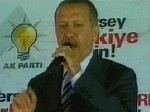 VOA
VOA - Turkish Prime Minister Recep Tayyip Erdogan says his government will submit to parliament plans for a possible military operation against Kurdish rebels in northern Iraq. VOA White House Correspondent Scott Stearns reports, the Bush administration says cross-border security concerns can be better addressed by working with the government in Baghdad.
Prime Minister Erdogan is under domestic pressure to act against rebels from the Kurdistan Workers' Party whose attacks have killed 15 Turkish soldiers since Sunday.
With some PKK rebels based in northern Iraq, the Ankara government plans to ask parliament for authority to move against them.
Some Turkish lawmakers say they are following the example of President Bush, who often says U.S. troops are fighting terrorists inside Iraq so they do not have to fight them at home.
While the United States considers the PKK a terrorist group, White House spokeswoman Dana Perino says the president does not support unilateral Turkish military action in Iraq.
"We have said that we want to work with the Turkish government and the Iraqi government to eradicate the terrorist problem there in northern Iraq," she said. "We do not think that it would be the best place for troops to go into Iraq from Turkey at this time. We think that we can handle this situation without that being necessary."
The U.S. State Department says PKK violence not only threatens Turkey, but undermines the security and welfare of Iraq as well.
Turkey is a crucial ally in America's fight against terrorism. Defense Secretary Robert Gates says the U.S. military is heavily dependent on the NATO ally when it comes to re-supplying more than 100,000 American troops in Iraq.
"About 70 percent of all air cargo going into Iraq goes through Turkey," he said. "About one-third of the fuel that they consume goes through Turkey or comes from Turkey."
Turkish forces launched a major offensive against the PKK this week in a southeastern province near the Iraqi border. Ankara holds the PKK responsible for the deaths of 30,000 people since 1984 when the group began fighting for a Kurdish homeland in southeast Turkey.
